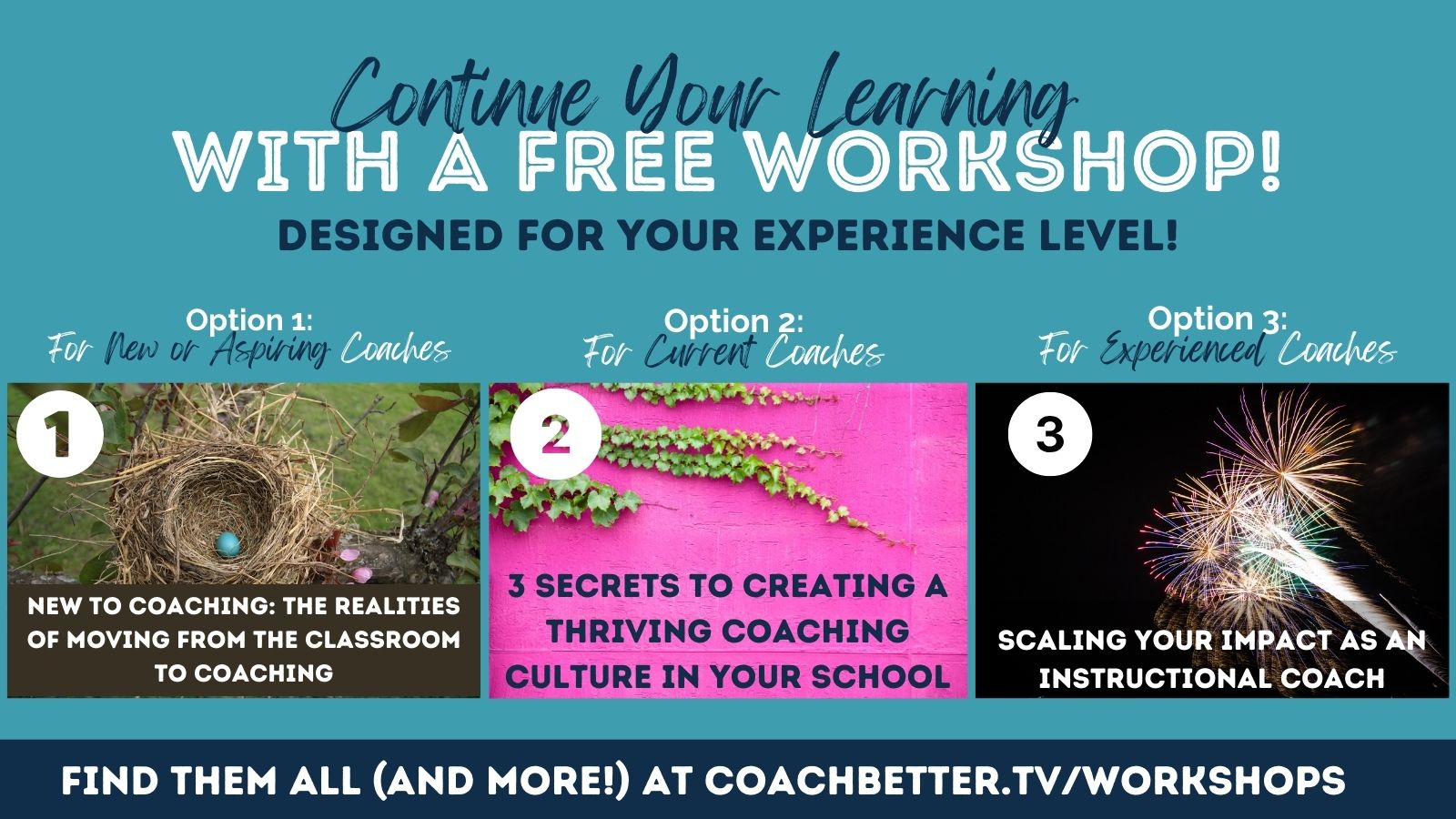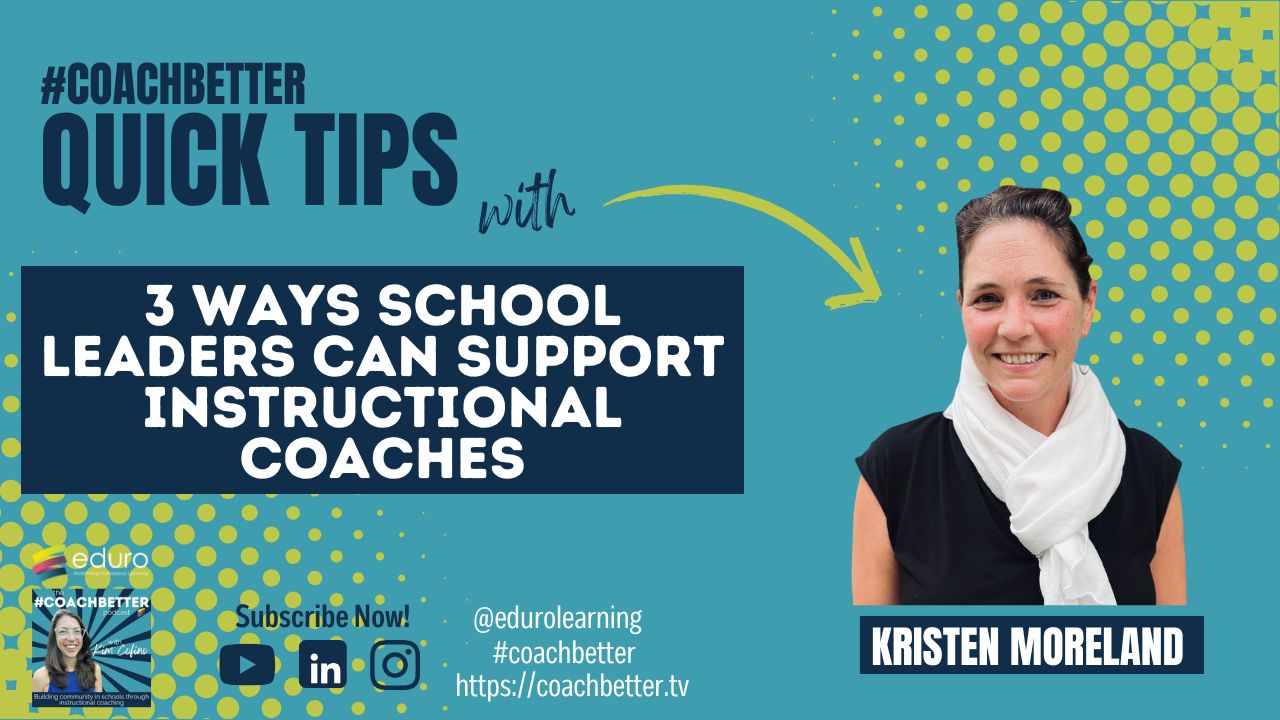I’ve had quite a few conversations with school leaders lately who are wondering how they can best support the instructional coaches they have on staff.
All too often we see schools hire instructional coaches and then assume the coaches themselves can build a coaching culture.
The reality is that it takes more than just hiring coaches to build a coaching culture. Even when instructional coaches know exactly what’s needed to take the school to the next step, they almost always need the support of their school leader to actually implement the work.
As we talk about all the time on this channel, and the #coachbetter podcast, instructional coaching is informal leadership, so having the tangible support of the positional leader is essential for taking action. If you’re an instructional coach watching this video, this would be a great conversation starter with your leadership team!
Here are 3 other great episodes about the informal leadership aspects of an instructional coaching role:
- Embracing Your Influential Leadership as an Instructional Coach
- Two Ways Instructional Coaches are Leaders
- Coaching Skills Aren’t Just for Coaches: Coaching As Leadership
And if you’re an experienced instructional coach ready to think about the ways that you can embrace your leadership in your coaching role, make sure to scroll all the way down to the end of this post for another resource that can help you take the next step!
If this is a conversation you’re having right now with your school leaders, make sure to download our free Leadership QuickStart Guide which features many quotes from school leaders here on the podcast that will help you advocate for coaching in leadership language today!
What’s YOUR level of coaching mastery?
All coaches go through various stages of coaching mastery. Once you identify where you’re at, you can begin to build the skills needed to move to the next stage.
This quiz is based on real-life case studies compiled from years of working with coaches inside The Coach Certificate & Mentorship Program!
When you receive your results, you’ll also get your matching case study from the STRIVE Case Studies to see where you fit in the stages of coaching mastery.
Ready to tackle your challenges and move on to the next level in YOUR coaching practice?

The STRIVE Model of Coaching Mastery quiz will help you identify your level of coaching mastery by matching you with case studies compiled from years of working with coaches inside The Coach Certificate & Mentorship Program so you can easily see where you fit!
When you complete the quiz, you’ll get:
- Your matching case study,
- Specific strengths & challenges aligned to your result;
- Suggested next steps for each stage;
Plus the Case Study Document includes:
- Case studies leveled by coaching mastery;
- A framework to identify essential stages of professional growth & key areas to focus on in your professional learning;
- Alignment with the THRIVE Model for a Successful Coaching Culture;
- Space for you to reflect & prioritize so you can take action immediately!
You’ll go straight to the Quiz, and get the Case Studies by email.
School leaders, this one is for you.
You have this amazing team of instructional coaches. How do you make sure that they STAY amazing? Working in partnership with your instructional coaches is key.
Here are three ways that you can power up this partnership:
1: Protect their time
First, and most importantly, leaders must protect their instructional coaches’ time and preserve the functions of their role.
I’m pretty sure that your coaches are some of the most helpful people in your building. They want everyone to be successful and happy, and they will bend over backwards to make sure that happens.
Sometimes, this means they might have a difficult time saying no. They are always simple requests – at first – maybe it is covering a class for a last minute substitute issue, or taking on lunch duty.
The main function of coaches is to be working with teachers, whether in classrooms 1:1 or supporting collaborative team meetings that are directly related to student learning. Making sure there is a clear job description is one way to protect the essential functions of your instructional coaches.
2: Provide professional learning
Provide professional learning and networking opportunities
Instructional coaching is a skill to learn and a craft to refine. One way to help your instructional coaches be at the top of their game is to ensure they have access to a robust network of other coaches and professional learning opportunities. Providing access to relevant conferences and other courses where they can connect with and learn from leaders in the field and other coaches in similar settings is a way to show your instructional coaches just how much they are valued.
3: Participate in coaching
Participate in your own coaching cycle
This one is key. While it is easy to champion the work of our instructional coaches when we see its impact on the school community, we can reach an entirely new level of understanding of this work when we engage in coaching ourselves. You could go all out and find your own leadership coach (a route I highly recommend), or, if you want to take it slow, maybe start by soliciting the help of one of your instructional coaches. Not sure what to focus on? Here are a few suggestions:
- We all know meetings take up a TON of time in schools- it is our responsibility as facilitators of those meetings to help make sure they are as positive and productive as possible. Your instructional coach could support you with agenda development or finding a great protocol to engage the faculty, or supporting you with an opening, inclusion moment to help your team make the transition from teacher to learner.
- Or, maybe you want to improve your facilitation. Your instructional coach can employ many of the same observation strategies they use with the teachers to observe YOU! You might ask your coach to track how long you are speaking vs. how much time your teachers have to process or engage with the content. Your coach might track the types of questions you pose….are they all “level 1” questions that could be asked and answered in an email? Or are you offering provocations that help teachers engage at a deeper level.
- As a leader, engaging with your instructional coach this way might ask you to embrace a level of vulnerability that you haven’t explored yet. This is where the magic happens. When you seek the support of someone who is both committed to your professional growth and trained in the techniques to enable it to happen, there is the possibility for real and lasting change. If this is the culture we want to create for our teachers, we can model the way by engaging in coaching ourselves
So, to recap. If you are a leader who support instructional coaches, remember the 3 P’s for a powerful partnership:
- Protect their time
- Provide professional learning
- Participate in coaching yourself.
These three actions can help create a culture of coaching that will empower everyone in your school!
Watch the Video
References
Killion, J. et al. (2020) Coaching Matters. (2nd ed.). Learning Forward.
Saclarids, E.S. & Munson, J. (2024, August). Forces that shape coaches’ classroom access. The Learning Professional. https://learningforward.org/journal/learning-to-pivot/forces-that-shape-coaches-classroom-access/
Key Takeaway: Coaches as Advocates for Coaching
If you like this one, you’ll also love a few other quick tips from previous seasons, I’ll link them all here for you:
- Scaling Your Impact
- Creating a Sustainable Coaching Culture
- 3 Steps to Growing a Thriving Coaching Culture
All of these videos will help you explore and embrace the leadership aspect of your instructional coaching role.
I love having this conversation because no matter where you are in your coaching journey, you need to be prepared to advocate for coaching. Even brand new coaches can often end up being the only one in their school setting who truly understands the value and purpose of instructional coaching.
That’s why we include coaching advocacy in ALL of our courses for coaches – at the level that’s right for your experience.
Each of our three global cohorts will help you take the next step in your coaching advocacy – either as a brand new coach in Getting Started as an Instructional Coach, or as a current coach in The Coach Certificate and Mentorship Program, or as a coach who’s ready to lead in Coaches as Leaders.
Find all the details about all of our courses for coaches at coachbetter.tv/learn and select the course that’s just right for your current experience level. Global cohorts open once a year.
Free Workshops for Instructional Coaches
If you’re ready to keep learning, try one of our FREE workshops where you’ll be able to dig deeper into the concepts in this post, and get a peek at all of our courses for coaches.
We have workshops (and courses) to support coaches at every stage of their career: from new and aspiring coaches making the move from classroom to coach; to current coaches ready to be more intentional and strategic in their practice; to established coaches leveraging their coaching experience to lead.

You can them all on our coachbetter website at coachbetter.tv/workshops
If you’re curious right now, you have questions, please reach out. You can leave a comment below, join our #coachbetter Facebook group, or find us on social media at Eduro Learning and send me a DM. I’d love to support you on your coaching journey. See you next time!
Connect with us!
Subscribe to the podcast iTunes |Spotify|Stitcher
Follow us on social media: Instagram |LinkedIn
Join our #coachbetter Facebook group

Recent Comments